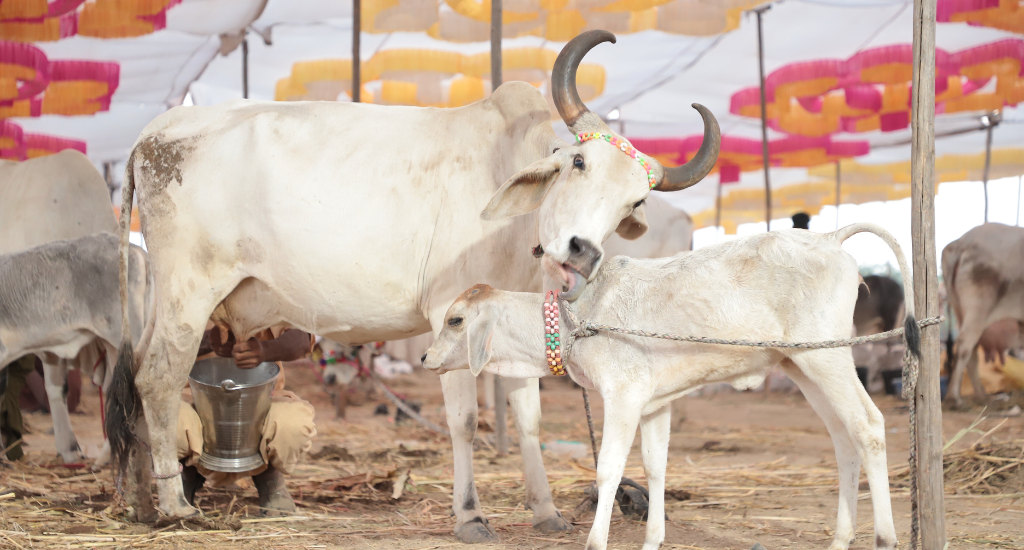
All you can find at the Banni pashu mela of Kutch
The Banni pashu mela, set against the mystical White Rann of Kutch in Gujarat, celebrates the revered Banni breed of buffalo and showcases the symbiotic bond between breeders and their livestock.

The Banni pashu mela, set against the mystical White Rann of Kutch in Gujarat, celebrates the revered Banni breed of buffalo and showcases the symbiotic bond between breeders and their livestock.
As the winter breeze whispers across the serene expanse of the white Rann of Kutch, a spectacular celebration unfolds in the westernmost district of India. Welcoming globetrotters from far and wide to the famed Rann Utsav, a parallel symphony comes to life in the Banni area. Here, amidst the arid beauty, animal breeders converge to honour their lifeblood – their cattle at the Banni pashu mela of Kutch.
In the proximity of the India-Pakistan international border, the region is home to the renowned Banni breed of buffalo. Thriving against the extremes of a desert climate, where temperatures soar to a blistering 50 degrees celsius in summer and plummet to a bitter 2 degrees celsius in winter, these buffaloes resiliently provide abundant milk on scant rations of food and water.
They stand not just as livestock but as a revered lifeline, transforming the lives of Banni’s breeders.
To pay homage to these noble creatures, the Banni Breeders’ Association, also known as the Banni Pashu Uchherak Maldhari Sangathan, organises an annual marvel – the Banni pashu mela of Kutch. Here, a thousand breeders from different villages unite, showcasing their buffaloes, cows, and horses. Amidst educative activities, riveting animal competitions, and cross-regional trading, the festival unfolds as a testament to the symbiotic relationship between man and beast.
Also Read: Amul’s camel milk a lifeline to depleting Kharai camel herders in Gujarat’s Kutch

During this animal fair, competitions are held for milk yield among buffaloes and cows, while oxen and bulls participate in strength and beauty contests, judged on factors like weight, height, and other physical characteristics.
Winning these competitions not only earns cash prizes but also increases the overall value of the cattle, enabling breeders to trade them at higher prices. This mela is credited for some Banni buffaloes being sold at prices as high as Rs 5 lakh.
In the twilight of the 20th century, the herders of Banni recognised the intrinsic value of their cattle. Determined to amplify animal husbandry in the region, they set their sights on forming an exclusive breeders’ association. Gathering scattered herders posed a challenge, leading to the inception of the Banni pashu mela in Kutch.
The inaugural event in January 2008 laid the groundwork, culminating in December with the formation of a 23-member team, representing each of the 19 villages in Banni.
Ishabhai Mutva, a founding member, reflected on the journey. “Banni is such a remote area that until we started the pashu mela and formed an association, the breeders here had no organised market to sell their animals or even its milk,” he said.
Also Read: Visit Kutch’s colourful craft village Nirona

Their visionary efforts bore fruit, making Banni the first breeders’ association in India to have a breed officially recognised by the federal government.
While the pashu mela embraces various animals, the spotlight invariably gravitates towards the Banni buffaloes. Showcasing their strength and beauty, these buffaloes become the cynosure, attracting buyers and dairy farm operators from states far and wide.
Salemamad Halepotra, president of the breeders’ union, recollected a bygone era when Banni buffalo milk sold for Rs 4 to Rs 8 a litre. Post-recognition, the stakes soared — milk prices touched Rs 60 a litre, and a Banni buffalo commanded a minimum of Rs 1 lakh, reaching a pinnacle of Rs 5 lakh.
Beyond commerce, the crux of the animal fair lies in preserving the Banni breed, nurturing robust animals of superior quality. Year-round care is instilled through strength, beauty, and milk competitions, fostering an emotional bond between herders and their cherished cattle.
Nutrient-rich meals are served twice a day, ensuring peak performance during competitions. Well-performing animals gain esteemed status, enticing higher value from buyers across Gujarat, Maharashtra, Rajasthan, and Madhya Pradesh.
While many herders participate in the festival without intending to sell their cattle, trust remains paramount. Buffaloes are not sold casually. A pact is forged between the buyer and seller. The buyer commits to returning the last heir of the buffalo to its original master, safeguarding the perpetuity of the Banni breed.
Also Read: A day at Pushkar camel fair

The fair transcends the realm of buffaloes, extending its embrace to humans in a cultural kaleidoscope of competition. Human races, the traditional wrestling game of Bakhmalakhdo, and horse races punctuate the festivities, fostering camaraderie between the region’s two preponderant pastoralist groups – the Banni muslim nomads and the Meghwal hindus.
The competitions, imbued with fervour, attract not just locals but even intrepid foreign tourists, drawn to witness the spirited bouts of Bakhmalakhdo. A horse race is conducted, requiring the jockey to ensure that the stead uses its front and back legs diagonally, known locally as the “revaal” walk.
“Along with the traditional sports, we also organise traditional music mehfils. The Banni Pashu Mela of Kutch is not only about conserving the animals but also about conserving the tradition and culture of Banni,” said Imran Mutva, programme coordinator at the breeders’ association.
Also Read: Solar pumps brighten lives of Kutch’s salt farmers
The lead image at the top shows Banni pashu mela in Kutch celebrating the revered Banni breed of buffalo (Photo by Amit Hedau)
Dhairya is a multimedia journalist from Gujarat and possesses a deep interest in writing about environment, wildlife and villages.